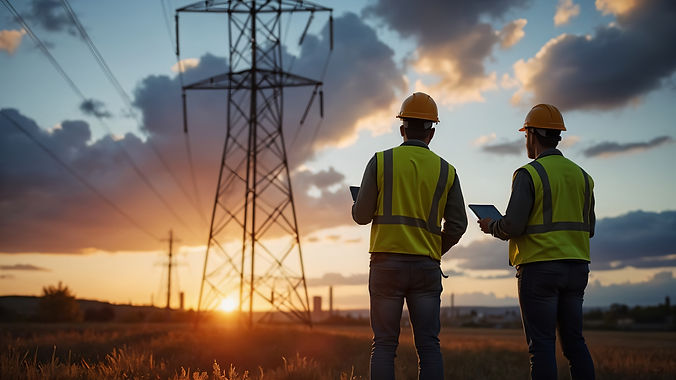
Alberta’s Electricity Future
Current Initiative
Initiative Sponsors
To thrive in a net-zero world, Alberta needs a grid upgrade.

Overview
As Canadians work together to reduce harmful GHG emissions, Alberta’s electricity system—one of our most valuable assets in that effort—faces a perfect storm of challenges to its future reliability and affordability. Tackling these complex, system-wide issues requires more than siloed, small-scale adaptations; we need a bold, collaborative approach that prioritizes solutions that meet the needs of people, communities, and businesses.
By rethinking how we generate, store, and transport electricity, we can build a resilient, future-ready grid that powers our economy while safeguarding the interests of generations to come.
Why It Matters
The Challenge
Alberta’s uniquely deregulated electricity system was built for a different era—not just the resources powering it, or the poles and wires, but the complex system of integrated players, policies and market signals that determine how much energy to produce, where it needs to go, and how much it will cost.
Today, rapidly growing demand, shifting supply, and climate risks are putting increased pressure on the grid, making its modernization more urgent than ever. At the same time, electricity must remain affordable for households and businesses to support economic growth while making shifts to eliminate emissions.
Addressing these complex, interrelated challenges requires innovation, bold collaboration, and a forward-thinking approach—one that brings together traditional system stakeholders, Rights and Title holders, and the voices of those groups the current system underserves or adversely impacts.

Our Approach
By bringing the system together to find alignment through a unified vision of our electricity future, identify key barriers that stand between today’s reality and that vision, and test solutions to remove those barriers, Alberta’s Electricity Future offers a better, more effective, and more equitable way to collaborate around solving these problems.
Updates
Update: DSM Research Summary
November 1, 2025
-
In collaboration with the Alberta Energy Efficiency Alliance, we released a public version of a briefing note on Demand Side Management (DSM) prepared for the Alberta Ministry of Affordability and Utilities.
Update: Round 1 Solutions Webinar
October 2, 2025
-
Recording of our Sept. 16 webinar, Powering Progress: Using Sprint Collaboration to Drive Electricity System Change in Alberta now available.
Update: Distribution Policy Recommendations
July 17, 2025
-
Published recommendations for optimizing Alberta’s electricity distribution system (originally presented to Minister of Affordability and Utilities Hon. Nathan Neudorf on May 29, 2025.)
-
Published op-ed in the Edmonton Journal: Alberta’s electricity distribution is key to improving affordability—and maintaining our economic advantage
Latest News & Insights
Who's Involved
From governments to industry to consumers, everyone has a role to play in unlocking solutions for Alberta’s electricity system.

Members of the Alberta’s Electricity Future coalition.
The Process
Timeline
WE
ARE
HERE
2026
-
2028
PHASE 1
Coalition Building &
Vision Creation
PHASE 2
Challenge
Identification
PHASE 3
Prototyping Solutions Round 1
PHASE 3
Prototyping Solutions Round 2
PHASE 4
Solution Implementation
Phase 1
Building a Vision
Phase 1 of Alberta’s Electricity Future brought together the AEF Coalition, a group of 60+ representatives from Alberta’s electricity system. Through interviews, workshops and working sessions, we created a baseline understanding of the current state of Alberta’s Electricity System and its most pressing challenges.
This first phase also engaged communities, students, experts, associations, and social justice groups, to test and enhance the coalition’s co-created vision, Leading the Charge: A Vision for Alberta’s Electricity Future.
Phase 1 Sponsors

Phase 2
Identifying Barriers and Drivers for Change
In Phase 2, the Lab conducted a review of over 60 studies, reports and electricity system modernization plans spanning 5 countries to uncover both regional and universal barriers to electricity systems change.
The barriers were then assessed from an Alberta lens to unearth the top 10 systemic barriers to advancing grid modernization in Alberta.
Alberta’s Electricity Future Challenge Statements
Solution Areas
Of these challenges, the coalition has identified 3 it feels are imperative to address as soon as possible. These will become the focus of Working Groups in Phase 3 of the initiative.
#1 - Incentivizing the optimization of existing electricity assets and infrastructure
#2 - A wholesale market structure that fully recognizes the benefits of diverse supply and demand resources
#9 - Evolving traditional business and delivery models to accommodate DERs
By taking on these 3 distinct but connected challenges, all grounded in meeting customers' changing needs, we will enable additional collaboration across the field to not only generate high impact individual solutions, but also ones that are mutually reinforcing.
Overview
In Phase 3, we have moved into the development of solutions to remove the barriers identified and prioritized in Phase 2.
From the 10 challenges outlined in the Challenge Statements, we convened 4 working groups in Round 1, and 3 working groups in Round 2, that include representatives of communities, agencies, policymakers and industry, as well as subject matter experts. These groups were tasked with conducting research and gathering best practices to devise specific, testable, mutually-supported interventions that address the root challenges to modernizing Alberta's electricity system.
To oversee and advise working groups responsible for generating solution prototypes, we've created Alberta’s Electricity Future Leadership Council. The council will provide strategic advice to the project delivery team, surface emerging opportunities or barriers to the solutions in development, and identify high-leverage opportunities to explore new solution areas.
The council includes electricity leaders and experts representing diverse perspectives from within the system and regions within the province.
Learn More
Interested in learning more or getting involved?
We are currently seeking funders for AEF Phase 3 and beyond. If you are interested in learning more about the benefits of investing in our work, please reach out to a member of the Challenge Team:
Related Initiatives
Join Us
Be part of shaping Canada's energy future —sign up for the latest insights and opportunities from the Lab











